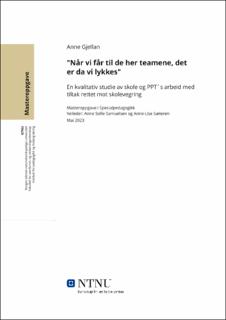"Når vi får til de her teamene, det er da vi lykkes" - En kvalitativ studie av skole og PPT´s arbeid med tiltak rettet mot skolevegring.
Master thesis
Permanent lenke
https://hdl.handle.net/11250/3080995Utgivelsesdato
2023Metadata
Vis full innførselSamlinger
Sammendrag
Dette forskningsprosjektet hadde som hensikt å undersøke hvilke erfaringer ansatte i skole og pedagogisk-psykologisk tjeneste (PPT) har fra arbeid med tiltak rettet mot skolevegring. Undersøkelsen tar for seg forståelse av begrepet skolevegring, forebyggende tiltak mot skolevegring, og tidlig intervensjon for å hjelpe elever som strever med skolevegring. Studiens overordnede problemstilling er: «Hvilke erfaringer har to ansatte i PPT og to ansatte i skole fra arbeid med tiltak rettet mot skolevegring?». Denne studien har et kvalitativt forskningsdesign. Datamaterialet er innhentet gjennom semi-strukturerte intervjuer av to kontaktlærere i grunnskolen og to rådgivere i PPT. Informantene i studien jobber i tre ulike kommuner og tilhører to ulike skoler og to ulike PPT-kontor. Studiens empiriske funn blir presentert gjennom de tre hovedkategoriene «forståelse», «forebygging» og «tidlig intervensjon» som ble utarbeidet i analysen av datamaterialet.
Studiens hovedfunn viser til at Informantene har en bred forståelse av begrepet skolevegring, og er kjent med hva som kan være risikofaktorer og opprettholdende faktorer til skolevegring. Funn viser også til en variasjon i bruk av begreper for skolevegring, og det fremstår noe uklart om fravær behøver være et kriterium for skolevegring. Et trygt skolemiljø, støttende relasjoner og systematisk føring av fravær blir av informantene utpekt som de viktigste forebyggende tiltakene mot skolevegring. Et sentralt funn er også at PPT gjennom fast tilstedeværelse på skolen kan bistå lærere med å identifisere elever som ikke har utbytte av universelle tiltak. Kartlegging av årsaker til vegring fremstår som det viktigste tiltaket i arbeid med tidlig intervensjon ved skolevegring, og elevens stemme trekkes fram som sentral for å finne gode løsninger. Å stabilisere elevens oppmøte fremstår som et viktig tiltak for å unngå at problemene forverrer seg og at årsaker til skolevegring utvikler seg til å bli mer kompleks. Empirien viser til at ulik forståelse av elevens behov skaper utfordringer i samarbeidet mellom skole og hjem. Det ser ut til at det er et behov for en nøytral part som kan skape en felles forståelse i samarbeidet. Empirien viser til hvordan et fraværsteam, eller nærværsteam, kan fungere som en koordinator inn i skole-hjem-samarbeidet. The purpose of this study was to examine what experience employees in school and employees in the pedagogical-psychological service (PPT) have from working with measures aimed towards school refusal. The study addresses school and PPT`s understanding of the term school refusal, preventive measures against school refusal, and early intervention to help students who struggle with school refusal. The overall research question for the study is: 'What experiences do two employees in PPT and two employees in school have from working with measures aimed toward school refusal?". This study uses a qualitative research design. The empirical data were gathered through semi-structured interviews with two teachers in primary school and two counselors in PPT. The participants in this study works in three different municipalities, and belong to two different schools and to different PPT offices. The empirical findings of this study are presented through the three main categories 'understanding', 'prevention' and 'early intervention', which were prepared through the data analysis.
The main findings of the study indicate that the informants have a broad understanding of the term school refusal, and are familiar with what may be risk factors and sustaining factors for school refusal. Findings in this study also show variations in the use of terms for school refusal, and it appears somewhat unclear whether absence from school needs to be a criterion for school refusal. A safe school environment, supportive relationships and systematic management of school absence were appointed by the informants as the most important preventive measures against school refusal. A key finding is also that PPT, through a permanent presence at school, can help teachers in identifying students who do not benefit from universal measures. Mapping the causes of refusal appears to be the most important measure working with early intervention in cases of school refusal, and the pupil's own voice seems to be central to finding good solutions. Stabilizing the pupils' attendance appears to be an important measure to prevent the problems from worsening, and to avoid the causes of school refusal from becoming more complex. Findings also show that different understandings of the pupils' needs create challenges in the collaboration between school and home. There seems to be a need for a neutral part that can create a common understanding in the cooperation. The empirical findings show that a school absence team, or a school-attendance team, can function as a coordinator in the cooperation between school and home.
